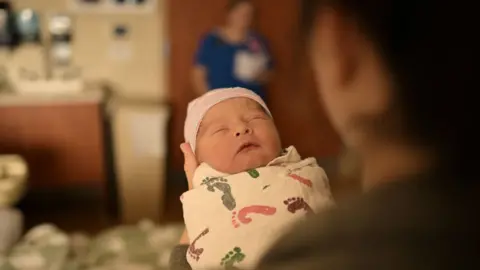Hospital joins 'world-leading' baby test study
 Getty Images
Getty ImagesA hospital has begun testing newborn babies for genetic conditions as part of a "world-leading" survey.
The Generation Study aims to test the entire DNA – or genome - of 100,000 babies across England to check for rare illnesses that can develop later in life with the hope of speeding up diagnosis and treatment.
The Norfolk and Norwich University Hospital (NNUH) is one of about 30 NHS hospitals taking part in the study.
It involves midwives taking blood samples from umbilical cords shortly after birth and sending them to a laboratory to be examined.
The test checks for disorders that develop in early childhood for which there are effective treatments.
The NHS said in some cases these diseases were curable, if caught early.
Research midwife and principal investigator, Leanne Trenerry, said: "Ninety-nine per cent of women who take part will receive a letter or email telling them there is 'no condition suspected'.
"For the 1% of 'condition suspected' cases, families will be contacted by an appropriate NHS specialist team to provide further testing to confirm a diagnosis."
Optional test
At present, newborns are given a heelprick blood test that checks for nine serious conditions, including cystic fibrosis.
As part of this new study, led by Genomics England, blood samples will help diagnose many more disorders, such as haemophilia and spinal muscular atrophy.
The NNUH said the optional test was open to all women over 16 who had a singleton pregnancy (not twins or triplets).
Expectant parents would be informed about the study at their 20-week scan appointment, the hospital added.
Genomics England said the plan was to collect evidence to determine whether genomic newborn screening should be offered to all children in future.
The company, which is government-owned, said blood samples and data would be securely kept for 16 years, and would only be accessed by approved healthcare researchers.
Follow Norfolk news on BBC Sounds, Facebook, Instagram and X.
